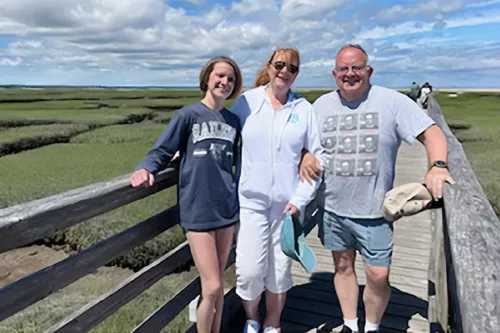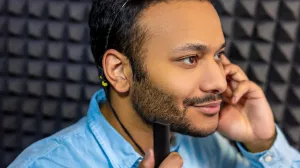
A cochlear implant helps a local business owner regain his connection with family, friends and community.
Sean McCarthy does not have time to be sick. The 71-year-old Holden resident has a business to run with his wife, Debbie, a vibrant congregation to serve with and a loving family to tend to. But in 2017, Sean began suffering from hearing loss and severe bouts of vertigo, which left him unable to function for days at a time. “I didn’t know when the vertigo attacks were going to happen,” says Sean. “But when they came on I couldn’t have escaped a fire if I needed to.”
Dozens of tests led to a diagnosis of Ménière's disease—an inner ear condition that causes vertigo, tinnitus and fluctuating hearing loss. It was a relief to have an explanation, but none of the treatments were helping, and Sean’s hearing continued to degrade. “Covid kind of hid how bad it was getting, but as we came off of restrictions, my wife and I could tell it was getting worse. I had to fake it with smiles and nodding—nothing was really helping and I couldn’t connect with people.”
Still, Sean was managing—continuing to run his business and give regular talks as part of his congregation’s activities, until one day in December 2023, he suffered a complete loss of hearing in both his ears while working in his yard. Soon after, he went to see Otolaryngology-Head & Neck Surgery specialist Kathryn Noonan, MD, and she was listening.
Dr. Noonan suggested Sean might be a good candidate for a cochlear implant, a small electronic device surgically implanted in the inner ear that helps those with hearing loss perceive sound. Cochlear implants aren’t hearing aids that amplify sound. Instead, cochlear implants use electrical signals to bypass the inner ear and create new pathways for sounds. “Patients who receive cochlear implants almost need to learn a new language,” says Dr. Noonan. “We have a very comprehensive process to ensure our patients are a good fit and will have good outcomes with the device. After the surgery, they work closely with our audiologists who work closely with the patient to train themselves to hear in a new way and adjust the device to fit their needs.”
In July of 2024, Dr. Noonan implanted the device, and Sean soon began work with Tufts Medical Center audiologist Collyn Gallant, AuD, CCC-A, to adjust the device to fit his needs and to re-train his brain through exercises. Throughout all of this, Debbie and his daughter Brittany have been a tremendous support—Debbie has attended every appointment and helped him with his exercises. While Sean continues to work to re-learn this new way of hearing, he is able to participate fully in his life.
“I feel like I’m re-entering life. I’m able to really connect and listen to people in a way I haven’t been able to for years. Everyone at Tufts Medicine have been incredible—Drs. Noonan and Gallant take the time to explain everything, answer my and my family’s questions and have been so respectful throughout my treatment.”
Asked what he would tell someone looking for treatment, Sean says: “I’d tell them to drive as fast as they can to the Tufts Medicine team.”
Are you concerned about hearing loss? Learn more about our ENT services
